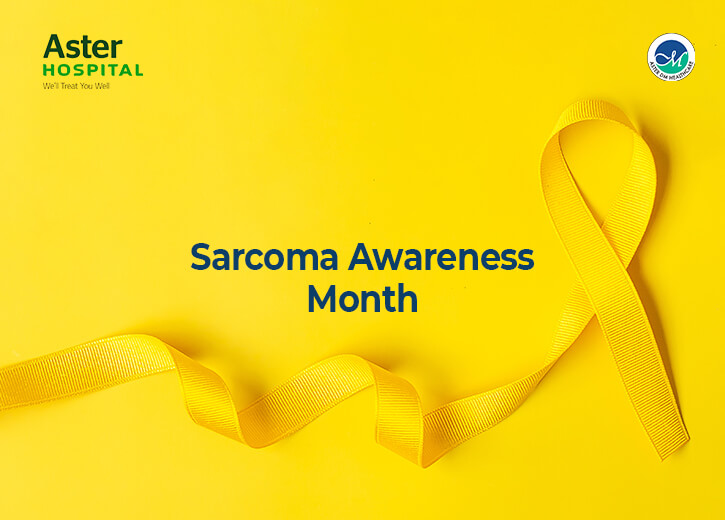July is observed as Sarcoma Awareness Month, and hence we have a great opportunity to raise awareness about this rare and unfortunate cancer during Sarcoma Awareness Month 2021. Sarcoma is a type of cancer that can occur in any part of the body. Sarcoma is an umbrella term used For a wide variety of cancers that originate in the bone and in the soft tissues. Soft tissues are also called connective tissues, and the sarcoma of the soft tissue is called soft tissue sarcoma. This type of sarcoma forms in those tissues that connect, support and surround other body structures, such as muscles, fat, blood vessels, nerves, tendons and the lining of your joints. Did you know there are more than 70 types of sarcoma? The treatment varies according to the type of sarcoma, location and other factors.
Sarcoma is a rare condition among adults. In fact, according to the American Society of Clinical Oncology (ASCO), it accounts for only 1% of all adult cancer cases. It is much more common in children, accounting for a total of around 15% of call childhood cancer cases. According to ASCO, around 60% of all sarcoma cases originate in an arm or leg, whereas 30% begin in the abdomen or torso, and 10% start in the neck or head.
Symptoms
Symptoms depend on the type of sarcoma and where it originates in the body:
Soft tissue sarcoma
Unfortunately, when people suffer from soft tissue sarcomas, they often don’t get any symptoms in the early stages. But when symptoms appear, the following might happen:
In some cases, a tumour in the form of a noticeable lump or swelling might occur. This is usually painless.
Pain can be a symptom if the tumour is pressing against local tissues, nerves, or muscles.
The symptoms can also help in identifying the specific type of sarcoma. Tumours in the gastrointestinal system, for example, may bleed. This will lead to symptoms such as blood in the stool or stools with a black, tarry appearance.
Bone sarcoma
The very first sign will be a pain, whether there’s a lump or not. It often affects the long bones present in the arm or leg or the pelvis. But signs and symptoms may appear only in a later stage if it affects the pelvis.
Types
There are more than 70 types of sarcoma. They include the following types:
Soft tissue sarcoma
Here are some of the types of soft tissue sarcoma:
-
Angiosarcoma – affecting the blood or lymph vessels
-
Gastrointestinal stromal tumour – affecting specialized neuromuscular cells of the gut
-
Liposarcoma – sarcoma of fat tissue. These often start in the thigh, behind the knee, or at the back of the abdomen
-
Leiomyosarcoma – affecting smooth muscles in organ walls (often in the abdomen)
-
Synovial sarcoma – tumour of the stem cells. Here a cancerous tissue can develop around the joints
-
Neurofibrosarcoma – affecting the protective lining of the nerves
-
Rhabdomyosarcoma – forms in the skeletal muscle
-
Fibrosarcomas – affecting fibroblasts (cells in the connective tissue)
-
Myxofibrosarcoma – affecting the connective tissue. It often develops in the arms and legs of older adults
-
Mesenchymoma – These are rare, and combine elements of other sarcomas. They can occur in any part of the body
-
Vascular sarcoma – occurring in the blood vessels
-
Schwannoma – affecting the tissues that cover the nerves
-
Kaposi’s sarcoma – mainly affecting the skin but can occur in other tissues. It results from the human herpesvirus 8
Sarcoma of the bone
Following are the types of sarcoma:
Osteosarcoma – affecting the bone
Ewing sarcoma – occurs in the bone or soft tissue
Chondrosarcoma – starts in the cartilage
Fibrosarcoma – occurs in fibrogenic tissue (a type of connective tissue)
Tests and diagnosis
Immediately contact the best hospital in Dubai if you notice a lump that is more than 2 inches across, if it’s getting bigger, or if you are experiencing pain. The doctor will then.
-
ask you about your symptoms
-
ask you about your personal and family medical history
-
conduct a medical examination
-
suggest imaging scans, such as an X-ray, MRI, CT, or PET scan
-
run lab tests
If you have previously undergone treatment for the removal of a tumour, the presence of new growth may mean it has returned.
Treatment
The best oncologists in Dubai may recommend one or more of the following treatment options for bone or soft tissue sarcoma:
-
Surgery
-
Radiation therapy
-
Chemotherapy
The choice and intensity of any treatment will depend on the stage and grade of cancer, the size of the tumour, and the extent of the spread.



